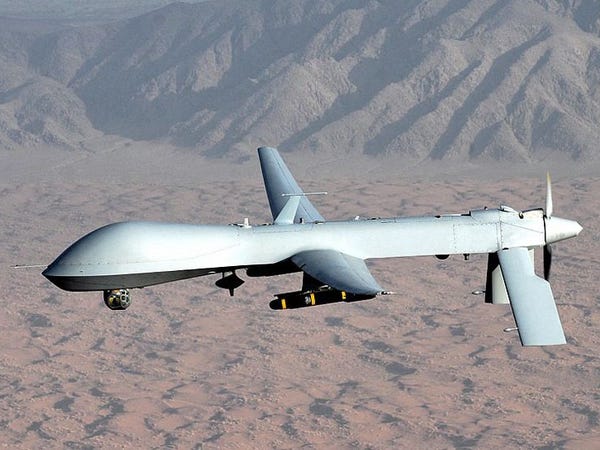On Thursday, the United States carried out a drone airstrike in Idlib, in northwestern Syria. Two senior al-Qaeda leaders died in the airstrike, according to the U.S. Central Command (CENTCOM).
“U.S. forces conducted a strike against Al Qaeda in Syria (AQ-S), in the vicinity of Idlib, Syria, Oct. 15. AQ-S continues to present a threat to America and our allies,” CENTCOM spokeswoman Maj. Beth Riordan said in a statement.
U.S. military officials said that the drone strike was carried out by the Joint Special Operations Command (JSOC).
Rami Abdel Rahman, the head of the Syrian Observatory for Human Rights (SOHR), a U.K.-based watchdog on the Syrian Civil War, said that a Jordanian and a Yemeni military commander from the al-Qaeda-affiliated Hurras al-Deen group were killed when a missile fired from a drone hit their car.
In the past several months, JSOC has more frequently used a specially designed non-explosive Hellfire missile. It is very effective against targets in light vehicles, such as cars or SUVs. It does not pose a threat to civilians due to its non-explosive nature. Officially designated as the Hellfire AGM-114R9X — usually shortened to R9X and sometimes known as the “Flying Ginsu” or the “Ninja Bomb” — the weapon has been increasingly deployed in targeted assassinations by JSOC. It was first used in 2017.
The missile was developed after terrorists adapted to U.S. airstrikes by hiding and traveling among the civilian population knowing that the United States was trying to limit collateral damage. The Hellfire counters that.
The weapon uses the force of 100lb of dense material flying at speeds of about 1,000 miles per hour and its six attached blades, which deploy before impact, to crush and slice its victims.
The Idlib region is the largest area not under government control; it is home to nearly three million people. Idlib is being threatened on one side by the Syrian government troops loyal to President Bashar Assad who is backed by Russia and on the other by the Turkish military which is moving more troops into the region.
The jihadist groups in Idlib are dominated by the Hayat Tahrir al-Sham group that is led by Syria’s former al-Qaeda group. Jihadists from Hurras al-Deen and other rebel groups are also present.
Also on Thursday, Human Rights Watch released a report claiming that Russian and Syrian troops targeted civilian infrastructure in the Idlib region. The Watch says that this amounts to war crimes and crimes against humanity.
The 167-page report, “‘Targeting Life in Idlib’: Syrian and Russian Strikes on Civilian Infrastructure,” provides damning accusations against Syrian and Russian armed forces. The actions detailed in the report took place throughout the now year-long campaign to retake the Idlib governorate.
Already have an account? Sign In
Two ways to continue to read this article.
Subscribe
$1.99
every 4 weeks
- Unlimited access to all articles
- Support independent journalism
- Ad-free reading experience
Subscribe Now
Recurring Monthly. Cancel Anytime.
The report examines how Syrian and Russian troops repeatedly violated the laws of war against the civilians of Idlib. It describes dozens of air and ground strikes that targeted hospitals, schools, marketplaces, and more civilian infrastructure, between April of last year and March of 2020. These attacks caused even more displacement of civilians.
Idlib is close to the Turkish border. Turkey, home to already more than three million displaced Syrians, closed its border to further refugees. The refugees are now staying in makeshift camps in poor conditions.
The report by Human Rights Watch has named 10 senior Syrian and Russian civilian and military officials who may be implicated in war crimes. The officials were aware of the abuses conducted but didn’t make any efforts to stop them.










COMMENTS